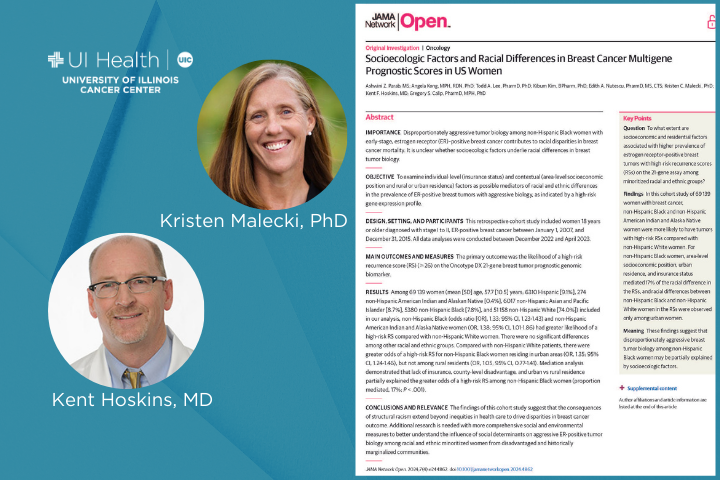
The journal JAMA Network Open published a study, “Socioecologic Factors and Racial Differences in Breast Cancer Multigene Prognostic Scores in US Women,” from University of Illinois Cancer Center researchers Kent Hoskins, MD, and Kristen Malecki, PhD, along with others from the University of Illinois Chicago (UIC).
The population-based study examined to what extent socioeconomic and residential factors are associated with the higher prevalence of estrogen receptor–positive breast tumors with high-risk recurrence scores on a 21-gene breast cancer biomarker test observed among minority racial and ethnic groups.
In JAMA Network Open
“This study demonstrates for the first time, to our knowledge, the influence of socioecologic context on a genomic biomarker that reflects the biology of ER-positive breast tumors. The study highlights the fact that the downstream effects of structural racism are not limited to inequities in health care; they also drive biologically aggressive tumor phenotypes. These effects are most clearly seen among non-Hispanic Black women, although the problem extends to other racial and ethnic minoritized groups (e.g., non-Hispanic American Indian and Alaskan Native women). The finding that among non-Hispanic Black women only those with urban residence have a disproportionate prevalence of biologically aggressive tumors confirms the central role of contextual factors as the root cause of this disparity. However, future research should examine the possibility that ancestry-related genetic factors may act as effect modifiers. Additional research is needed with more comprehensive and nuanced measures of the social and environmental exposures that urban non-Hispanic Black and non-Hispanic American Indian and Alaskan Native women are subjected to. Mechanistic studies are also needed to identify potential targets for interventions that improve outcomes for racial and ethnic minoritized women with ER-positive breast cancer,” the study concluded.
Hoskins is the Oncology Service Line Medical Director at UI Heath, where he also cares for patients, and is part of the Cancer Center’s leadership team. Malecki is Professor and Division Director of Environmental and Occupational Health Sciences at the UIC School of Public Health. The study’s corresponding author Gregory S. Calip, PharmD, MPH, PhD, was a Cancer Center member and Assistant Professor at the UIC School of Pharmacy before moving to the University of Southern California (USC).
